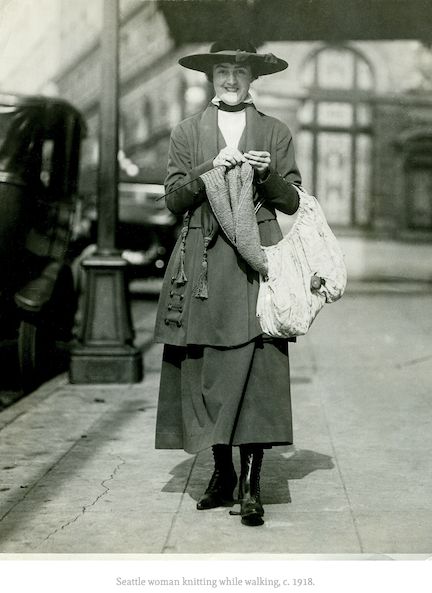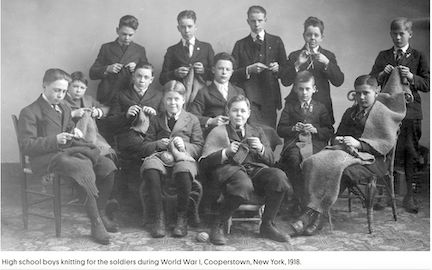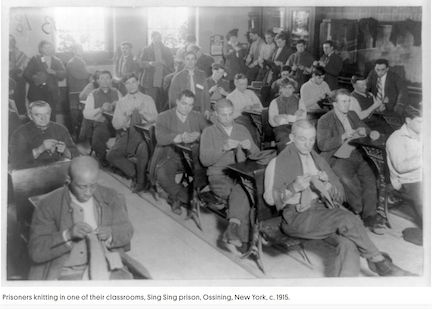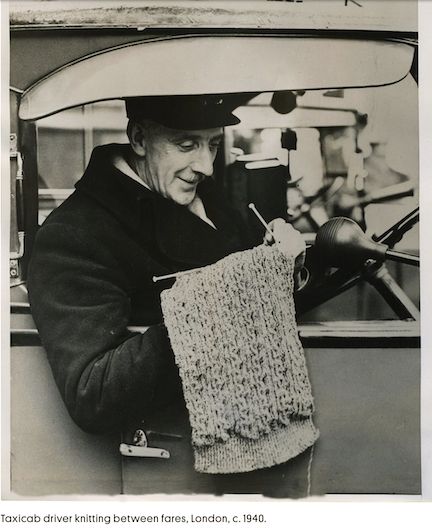Knitting Away Idleness
Weird Wonders reports:
In 1918, if you saw a woman walking down the street, chances are her hands weren’t idle. With needles clicking and yarn flowing, she was likely knitting on the move—adding rows to a pair of socks while heading to work or strolling through town. It wasn’t unusual. It was everyday resilience, wrapped in wool.
During [World Wars I & II], knitting wasn’t just a pastime—it was a patriotic act. Women across the Allied nations answered the call to support soldiers overseas by crafting socks, scarves, mittens, and caps. Red Cross campaigns and posters urged them to “Knit for Victory,” and they responded—often using every spare moment to help. Even their walks became turned into a workshop.
But this wasn’t just about necessity. It showed skill, determination, and a beautiful kind of multitasking. These women made the most of each moment, choosing usefulness over leisure, weaving warmth and care into every stitch. In a time without modern distractions, they found meaning in motion—turning something as simple as walking into a gesture of hope and solidarity.
It’s a small glimpse into the strength of that generation—and the quiet ways they changed the world.

Knitting while walking was more than just a practical skill—it carried deep cultural significance. In many communities, particularly in Scotland and England, it symbolized efficiency, industriousness. Women, especially fisherwomen, would knit while walking to maximize their productivity, ensuring that every moment was used most efficiently.
Beyond practicality, knitting while walking also reflected social and communal traditions. It was often done in groups, fostering a sense of community and shared purpose. In some cases, it was even seen as a form of resistance and empowerment, as women used their craft to support their families and contribute to local economies.
The act of knitting while walking, in particular, reinforced the idea that women could balance domestic responsibilities with broader societal contributions.
But knitting in what would otherwise be "idle" moments was NOT just female phenomenon. Even young school boys, prison inmates, and taxi-cab drivers got in on the action.



Time is ticking away. Are you making the best use of it?
Okay, you may not want to take up knitting. But are there small habits you can incorporate into you day to turn your idle time into more productive time? Perhaps making phone calls of encouragement while driving to work or the grocery store, or going through your prayer list while fixing supper, or listening to Scripture while you mow the lawn or work on the car. Or better still, turn off the TV and go mow your elderly neighbor's lawn! You get the idea ... just be creative!
Now, by way of balance, we are not called to fill EVERY idle moment with meaningful activity. After all, it was the Lord Himself who ordained the Sabbath rest. Yet we are still admonished in Scripture to make the best use of our time to: 1) to take opportunities for ministry and service, and 2) to avoid the traps of idle hands, hearts, and lips.
So pick up some needles [literal or figurative LOL] and get going! Like the knitters of generations gone by, "in quiet ways" we "can change the world!"
"Look carefully then how you walk, not as unwise but as wise, making the best use of the time, because the days are evil. Therefore do not be foolish, but understand what the will of the Lord is" (Ephesians 5:15-17 ESV).
"Besides that, they learn to be idlers, going about from house to house, and not only idlers, but also gossips and busybodies, saying what they should not" (1 Timothy 5:13 ESV).
She looks well to the ways of her household and does not eat the bread of idleness" (Proverbs 31:27, ESV).
"For we hear that some among you walk in idleness, not busy at work, but busybodies" (2 Thessalonians 3:11 ESV).
"A slack hand causes poverty, but the hand of the diligent makes rich" (Proverbs 10:4, ESV).
"For you remember, brothers, our labor and toil: we worked night and day, that we might not be a burden to any of you, while we proclaimed to you the gospel of God" (1 Thessalonians 2:9 ESV).
"A little sleep, a little slumber, a little folding of the hands to rest" (Proverbs 6:10 ESV).
In The Next Thirty Seconds
In the next 30 seconds you will, on average:
- Take 8 breaths.
- Produce .3 grams of carbon dioxide.
- Your heart will beat 36 times.
- Produce 72 million red blood cells.
- Your blood will travel 4 miles.
You accomplish more by just standing where you are than in all of your other endeavors! If that's true in the physical realm, it is even more true in the spiritual realm. We accomplish more by being "in the Spirit" than anything we might then go on to do.
"The Spirit gives life; the flesh counts for nothing. The words I have spoken to you--they are full of the Spirit and life" (John 6:63).
There Is No 'I' In A Team of Ants
Is it any wonder that the writer of Proverbs asks us to "consider the ant?" What if every member of a local church worked together with that kind of teamwork? And what if all of the churches in the world combined their efforts? Can you imagine the impact we could have if we moved and operated as one? With Christ as our Head, shouldn't it be said of us that, "the operational unit is not the individual but the entire Church"?
"Go to the ant, you sluggard; consider its ways and be wise!" (Proverbs 6:6).
"He makes the whole body fit together perfectly. As each part does its own special work, it helps the other parts grow, so that the whole body is healthy and growing and full of love" (Ephesians 4:16).
Illustration Exchange